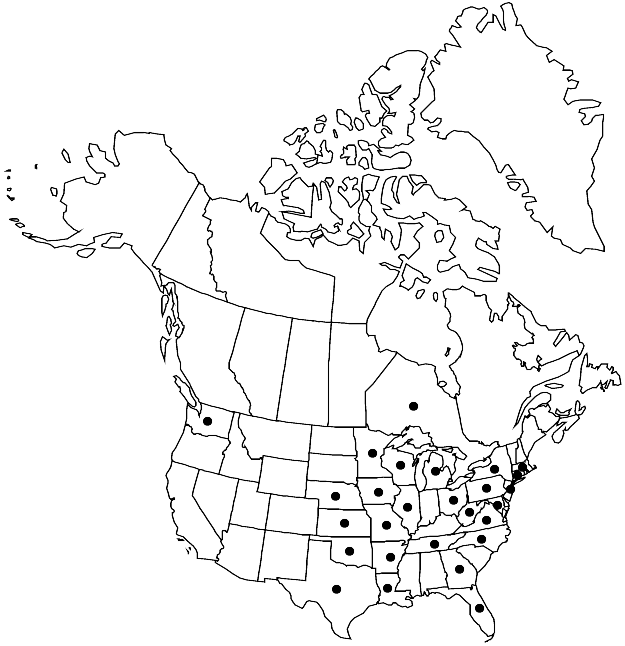Difference between revisions of "Haplocladium virginianum"
in H. G. A. Engler and K. Prantl, Nat. Pfla n zenfam. 229[I,3]: 1007. 1907.
FNA>Volume Importer |
FNA>Volume Importer |
||
| Line 26: | Line 26: | ||
|elevation=low to moderate elevations (0-1200 m) | |elevation=low to moderate elevations (0-1200 m) | ||
|distribution=Ont.;Ark.;Conn.;Fla.;Ga.;Ill.;Iowa;Kans.;La.;Md.;Mass.;Mich.;Minn.;Mo.;Nebr.;N.J.;N.Y.;N.C.;Ohio;Okla.;Pa.;Tenn.;Tex.;Va.;Wash.;W.Va.;Wis.;c Europe. | |distribution=Ont.;Ark.;Conn.;Fla.;Ga.;Ill.;Iowa;Kans.;La.;Md.;Mass.;Mich.;Minn.;Mo.;Nebr.;N.J.;N.Y.;N.C.;Ohio;Okla.;Pa.;Tenn.;Tex.;Va.;Wash.;W.Va.;Wis.;c Europe. | ||
| − | |discussion=<p>Haplocladium virginianum has more regularly branched stems than H. angustifolium and H. microphyllum, while the crowded, rounded, weakly concave branch leaves have shorter apices. The branches are julaceous. The small laminal cells and relatively large single papilla centered over the lumen will also help to identify this species.</p> | + | |discussion=<p><i>Haplocladium virginianum</i> has more regularly branched stems than <i>H. angustifolium</i> and <i>H. microphyllum</i>, while the crowded, rounded, weakly concave branch leaves have shorter apices. The branches are julaceous. The small laminal cells and relatively large single papilla centered over the lumen will also help to identify this species.</p> |
|tables= | |tables= | ||
|references= | |references= | ||
| Line 50: | Line 50: | ||
|publication year=1907 | |publication year=1907 | ||
|special status= | |special status= | ||
| − | |source xml=https://jpend@bitbucket.org/aafc-mbb/fna-data-curation.git/src/ | + | |source xml=https://jpend@bitbucket.org/aafc-mbb/fna-data-curation.git/src/8f726806613d60c220dc4493de13607dd3150896/coarse_grained_fna_xml/V28/V28_537.xml |
|genus=Haplocladium | |genus=Haplocladium | ||
|species=Haplocladium virginianum | |species=Haplocladium virginianum | ||
Revision as of 17:06, 18 September 2019
Plants small to medium-sized. Stems regularly pinnate; paraphyllia many, filamentous to subfoliose, frequently branched. Stem leaves erect to erect-spreading, dense, ovate, not plicate, 0.5–0.7 mm; margins plane, weakly serrulate; costa ending in apex. Branch leaves crowded, imbricate, oval, 0.2–0.5 mm; apex acute, apiculate, or short-acuminate; alar cells not differentiated; medial laminal cells rounded-quadrate, strongly 1-papillose over lumen, walls incrassate. Capsule strongly inclined to horizontal. Spores 11–12 µm, weakly granulate.
Phenology: Capsules mature spring–late summer.
Habitat: Soil, wood, rock of mesic habitats
Elevation: low to moderate elevations (0-1200 m)
Distribution

Ont., Ark., Conn., Fla., Ga., Ill., Iowa, Kans., La., Md., Mass., Mich., Minn., Mo., Nebr., N.J., N.Y., N.C., Ohio, Okla., Pa., Tenn., Tex., Va., Wash., W.Va., Wis., c Europe.
Discussion
Haplocladium virginianum has more regularly branched stems than H. angustifolium and H. microphyllum, while the crowded, rounded, weakly concave branch leaves have shorter apices. The branches are julaceous. The small laminal cells and relatively large single papilla centered over the lumen will also help to identify this species.
Selected References
None.